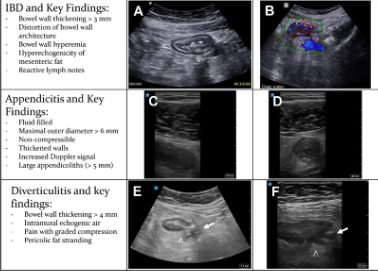By : Geraldus Sigap

What is Intestinal Ultrasound (IUS)?
Intestinal Ultrasound (IUS) is a non-invasive imaging technique that uses sound waves to visualize the small and large intestines without any radiation exposure. Through IUS, doctors can assess intestinal inflammation, wall thickening, obstructions, or structural abnormalities quickly and comfortably. Because it is real-time, safe, and painless, IUS has become an increasingly popular choice for diagnosing digestive issues or inflammatory bowel diseases.
When is Intestinal Ultrasound Needed?
Your doctor may recommend an IUS examination if you experience:
- Persistent or recurring abdominal pain
- Chronic diarrhea or irregular bowel movements
- Unexplained weight loss or fatigue
- Suspected inflammatory bowel disease (IBD) such as Crohn’s disease or ulcerative colitis
- Monitoring treatment response in IBD patients
- Unclear digestive symptoms after other tests
While IUS has many advantages, it also has some limitations — for example, it may be difficult to visualize very deep sections of the intestine and requires an experienced operator.
How is IUS Performed?
- The patient lies down in a comfortable position to allow optimal access to the abdominal area.
- A layer of special gel is applied to the skin to improve sound wave transmission.
- The doctor moves the ultrasound probe gently across the abdomen.
- Real-time images of the intestinal wall, mucosa, and surrounding tissues appear on the screen.
- If any abnormality is found, such as wall thickening, the doctor may recommend further tests like CT or endoscopy.
What Can Be Detected with IUS?
- Intestinal wall thickening
- Structural changes of the intestine
- Signs of inflammation
- Ulcers or erosions (depending on depth)
- Obstructions or narrowing
- Fluid collection or abscess around the intestine
- Treatment response evaluation in IBD patients

Figure 1. Abnormal findings from the intestinal ultrasound
Who Should and Shouldn’t Have IUS?
IUS is suitable for:
- Patients with chronic digestive symptoms without a clear diagnosis
- Individuals with IBD needing treatment monitoring
- Patients looking for a non-invasive alternative before undergoing endoscopy or CT
IUS may not be suitable if:
- The patient has an acute intestinal emergency (e.g., bowel perforation)
- Excessive gas or stool blocks image visualization
- The affected area is too deep to reach clearly
Combining IUS with Other Examinations
Intestinal ultrasound is often used as an initial or complementary test alongside:
- Endoscopy / Colonoscopy
- CT Abdomen or MRI Enterography (MRE)
- Laboratory and inflammatory marker tests
- Combining these results gives a more comprehensive and accurate diagnosis.
At RS Abdi Waluyo, the Gastrointestinal & Hepatology Center provides integrated care for digestive system disorders, including small and large intestinal diseases. RS Abdi Waluyo’s gastroenterology team is supported by experienced specialists in endoscopy and digestive health. If you or a family member often experience abdominal pain, irregular bowel movements, or persistent digestive discomfort, don’t ignore it. Consult your condition with the Gastroentero-Hepatology specialist team at RS Abdi Waluyo, which offers complete diagnostic and therapeutic care for digestive health. Contact 021-3144989 or book an appointment online via https://abdiwaluyo.com
Resource :
- Piro, K., Ma, I. W. Y., Shokoohi, H., & Novak, K. (2025). Intestinal Ultrasound in Common Gastrointestinal Disorders: An Evidence-Based Approach. The Medical clinics of North America, 109(1), 177–189. https://doi.org/10.1016/j.mcna.2024.08.006
- Piro K, Ma IWY, Shokoohi H, Novak K. Intestinal Ultrasound in Common Gastrointestinal Disorders: An Evidence-Based Approach. Med Clin North Am. 2025 Jan;109(1):177-189.
